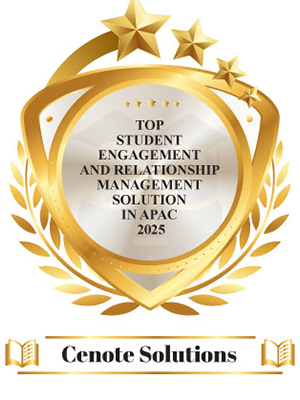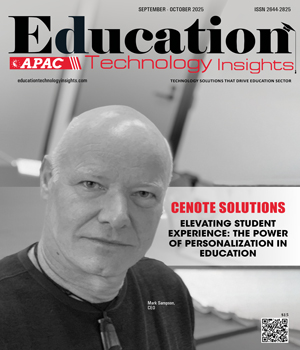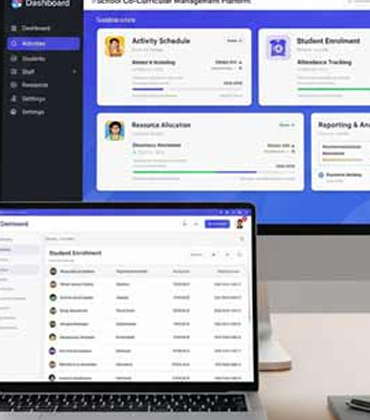THANK YOU FOR SUBSCRIBING
Be first to read the latest tech news, Industry Leader's Insights, and CIO interviews of medium and large enterprises exclusively from Education Technology Insights
While generic CRM platforms excel at automating tasks like sales tracking and email outreach, they often fall short in the world of education. Education is far more than a series of transactions; it's about building connections, engaging students, and offering impactful, personalized support. At the same time, many institutions have already invested heavily in tools and platforms not built for this level of complexity. These systems can fall short, making it challenging to course-correct. Rather than a full reset, institutions can benefit more from a way to build on what is already there without having to undertake major overhauls. Cenote Solutions recognizes these complexities and addresses them with its purpose-built software, Student Pulse. Offering unmatched personalization and agility, this all-inclusive engagement, support, and relationship management application enables institutions to connect with students on a deeper level. The platform equips schools with tools to manage and enhance all facets of the student experience, including recruitment, retention, and even mental health support. “Education is a complex space with highly specific needs. Larger CRM systems may offer broad functionality, but they are not built for the specific needs of educational institutions. They're not designed to understand a student's mood or provide personalized engagement based on their academic or personal context,” says Mark Sampson, CEO. “That's where we excel." Student Pulse offers sector-specialist applications and services to the education and training industry, maximizing the value of data institutions already have to facilitate an improved student experience. Its affordability and rapid ROI make it an even more compelling choice for educational institutions. Universities may spend millions on traditional CRM systems, but Student Pulse offers comparable or even better outcomes for a fraction of the price. Apart from its cost-effectiveness, agility is built into its DNA. As a smaller, market-focused business, the team behind Student Pulse can quickly respond to the evolving needs of its clients. It gets solutions to the market faster and ensures institutions have what they need, when they need it. The flexibility of the software is further enhanced by its cloud-based infrastructure. Student Pulse is based on a robust PostgreSQL database that easily integrates with existing systems, enabling organizations to compile data from various sources into a single, all-inclusive platform. Institutions can more easily interact with students through their preferred channels using the multi-channel communications engine, which supports everything from social media to text messages and emails.
Learning Management System
Learning management systems (LMS) have revolutionized the way academic and corporate training modules are created, conducted, and delivered. But not all LMSs are built the same. The challenges for smaller organizations are different from those of larger ones. While the latter has a dedicated IT team at their disposal to manage the LMS, the former must manage their operations with limited time, skill sets, and budget. That doesn’t mean schools or companies must compromise on the advantageous features of LMS just because of tight budgets. They need an LMS that fits their requirements and works per their expectations, not only on paper but in the real environment. learningBOX offers just that. learningBOX is geared toward helping small (and big) organizations with its excellent LMS offerings combined with costefficiency and a configurable user interface.
Distance and Remote Learning Solutions Provider
According to a study by the University of Salford in 2016, classroom design impacts student academic progress by 25 percent. Because of this, many schools are focusing on building effective learning environments, aiming to find a perfect blend of physical and virtual instruction. This is precisely what Empower Education Online (EEO) helps training and educational organizations achieve. EEO brings to life the benefits of hybrid learning by pairing a pedagogically-based software platform for virtual learning with a full suite of hardware that turns any room into a hybrid classroom. Serving over 50 million students worldwide, it facilitates educational progress by delivering the only online classroom designed specifically for teachers and learners, giving educators the ability to deliver hybrid, blended, or virtual learning. EEO builds a classroom that is digitized, networked, and intelligent. “We foster a seamless hybrid learning environment through our flagship product, ClassIn. The immersive and powerful software embeds over 20 interactive tools and can be availed on any digital platform,” states Ted Mo Chen, Vice President for Globalization at EEO. “Its features include polling, stopwatches, quizzes,drag-and-drop STEM experiments, breakout rooms, and multi-way screen sharing to save teachers from constantly switching between multiple browser tabs.”
CXO INSIGHTS

Navigating the Future of TAFE with Innovative Strategies
Travis Sandeman, Industry Curriculum Manager, Wodonga Institute of TAFE

Selecting the Right Student Information System For Educational Success
Dr. Andy Mifsud, Director Digital Learning Innovation, Barker College Sydney, Australia

Are You Teacher-Centered, Student-Centered, or Mixed?
Avelino G. Ignacio Jr., Associate Professor, Research Program Component Head, Bulacan State University, Philippines

Management of Neurodiverse Employees
Glen Ruane, Manager Campus Technology, Murdoch University

Thanks Anyway, President Trump
Dr. Rosetta Romano, Assistant Professor of Information Technology and Systems, The University of Canberra

Lighting The Path - Elevating Career Leadership For A New Era Of Graduate Education
Shinn Teo, Associate Director - Alumni & Careers, Southeast Asia & Oceania, IE University

Zombies, Wizards and Superheroes
Tim Lovatt, Head of Digital Learning, UWC South East Asia
IN FOCUS
Enhancing Student Engagement in APAC through Integrated Relationship Management Solutions
In the APAC region, integrated relationship management solutions enhance student engagement, retention, and personalized learning, promoting strong student-teacher relationships and fostering a sense of belonging.
SRM Platforms Reshaping Higher Education in APAC
A shift in APAC higher education emphasizes integrated student engagement and retention through advanced SRM platforms, fostering personalized support for a successful student journey.
EDITORIAL
Student Success and Institutional Transformation in APAC
Student engagement and relationship management solutions are a cornerstone of this shift. Campus apps, live polling, nudges, and behavioral analytics are improving participation, retention, and overall wellbeing. At the same time, education CRMs are unifying recruitment, advising, and alumni relations into a seamless lifecycle, enabling universities to maintain stronger and more personalized connections with learners.
Supporting these innovations are advanced teaching and learning platforms, along with learning management systems that serve as the operational backbone of education. They deliver content, assessments, and credentials while integrating with proctoring, video, and authoring tools. Growing demand for micro-credentials, analytics dashboards, and mobile interoperability has fueled significant LMS market expansion across Asia-Pacific as universities and corporations intensify their digital training efforts.
Equally important is interoperability and data governance. Open APIs and employer integrations connect institutions to workforce pipelines, while mobile-first engagement and real-time analytics shape how education is delivered. This momentum has created fertile ground for AI-driven startups across APAC, attracting global investment.
Massey University in New Zealand reflects these trends by embedding digital, distance, and lifelong learning into its strategy, ensuring flexible pathways for students worldwide. In the Philippines, Bulacan State University is expanding online portals and upgrading LMS platforms to broaden access to quality e-learning.
In this roundup we highlight innovators redefining education with coaching, automation, and analytics. This curated overview encourages institutions to adopt smarter, tech-driven strategies for building resilient, high-performing learning communities and driving measurable impact.
I agree We use cookies on this website to enhance your user experience. By clicking any link on this page you are giving your consent for us to set cookies. More info

However, if you would like to share the information in this article, you may use the link below:
www.educationtechnologyinsightsapac.com/edition/september-october-2025-17.html










